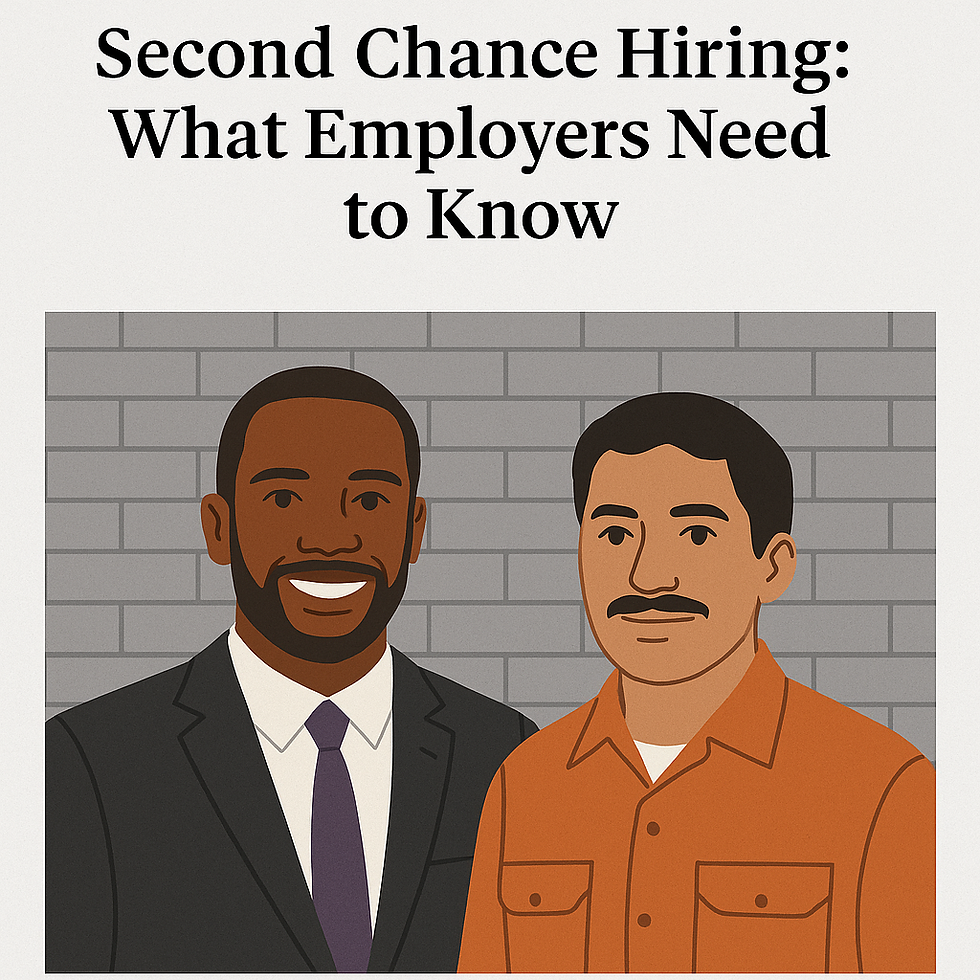Second Chance Hiring: What Employers Need to Know
- Derek Bluford

- May 6, 2025
- 3 min read

Every day, thousands of people return home from incarceration, ready to work—but unable to find employers willing to give them a shot. For businesses, this means missing out on motivated, loyal, and often highly skilled workers.
At A Better Tomorrow (ABT Community), we work with justice-impacted individuals and the employers who hire them. In this blog, we’ll explain why second chance hiring isn’t just the right thing to do—it’s a smart business decision.
What Is Second Chance Hiring?
Second chance hiring refers to the practice of employing individuals with criminal records, particularly those who have been previously incarcerated. These policies often include:
Reassessing automatic disqualification based on background checks
Removing questions about criminal history from initial job applications
Creating internal support systems for formerly incarcerated employees
Partnering with reentry organizations to recruit and retain talent
This isn’t charity—it’s about removing unnecessary barriers and opening the door to untapped potential.
Why It Matters
There are over 70 million Americans with a criminal record.¹ That’s nearly one in three adults. And every year, over 600,000 people return home from prison.
Without a job, the likelihood of recidivism skyrockets. But employment cuts the risk of re-offending by more than half.² For individuals, families, and communities, work equals stability.
For employers, it means a committed workforce and stronger communities where they operate.
Common Misconceptions About Hiring Justice-Impacted Workers
MYTH #1: People with records can’t be trusted.FACT: Studies show that second chance employees are often more loyal and stay in their jobs longer than their peers.³
MYTH #2: It’s a legal liability.FACT: With proper hiring practices and risk assessments, second chance hiring poses no greater legal risk than hiring someone without a record.
MYTH #3: It’s only for low-wage, low-skill jobs.FACT: People with records work in tech, construction, manufacturing, logistics, food service, and even management. Many are highly trained, credentialed, or eager to upskill.
Business Benefits of Second Chance Hiring
Reduced turnover: Many justice-impacted employees are grateful for the opportunity and committed to proving themselves.
Tax incentives: Employers may be eligible for the Work Opportunity Tax Credit (WOTC) for hiring individuals with felony records.
Expanded talent pool: In a tight labor market, second chance hiring opens access to millions of qualified applicants.
Diversity, Equity & Inclusion (DEI): Second chance hiring supports broader DEI goals by addressing systemic barriers and inequities.
Positive public image: Consumers support brands that take a stand on social justice and reinvest in their communities.
What Employers Can Do Today
✅ Remove the Box
If your job application still asks about criminal history in the first round, remove the checkbox. Let applicants be evaluated on merit first.
✅ Partner with Reentry Organizations
A Better Tomorrow can connect your company with job-ready candidates, offer training, and provide ongoing support to both employers and employees.
✅ Offer Fair Chance Interviews
Train hiring managers on how to fairly assess candidates with records. Consider the nature of the offense, time since conviction, and relevance to the job.
✅ Establish Supportive Work Environments
Mentorship, clear policies, and access to HR support make a huge difference. Build a culture that supports growth—not one that polices fear.
Real Success Stories
At ABT Community, we’ve helped place dozens of formerly incarcerated individuals into careers—not just jobs. From forklift operators and baristas to warehouse supervisors and outreach coordinators, our participants are thriving.
And so are the companies that hire them.
Final Thoughts: Changing Lives—and Business—for the Better
Second chance hiring isn’t about lowering standards—it’s about redefining potential. With the right tools, people with records can become some of your most dedicated team members.
If you're an employer ready to open your doors to justice-impacted individuals, let’s talk. At A Better Tomorrow, we’re building bridges between talent and opportunity—because everyone deserves the chance to move forward.
📚 Sources:
National Employment Law Project (NELP). (2022). Fair Chance Licensing Reform. https://www.nelp.org
RAND Corporation. (2021). Employment Reduces Recidivism. https://www.rand.org
SHRM & Koch Industries. (2021). Getting Talent Back to Work Report. https://www.shrm.org





Comments